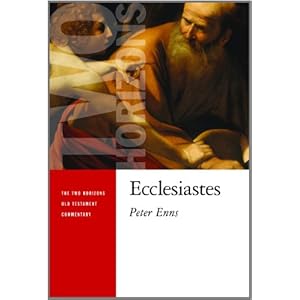
Below is an interview between myself and OT Scholar Pete Enns. He is one of the foremost thinkers on critical scholarship and evangelical faith. You can read his thoughts on Ecclesiastes below, which in my opinion is one of the most confusing books in the bible. You can read the other parts of the series here….
————————————
How does all of this fit with the rest of the Bible? Isn’t Ecclesiastes way out of sync with the life of faith Scripture holds out for us?
Ecclesiastes lets us in on the dark side of faith, something every Christians experiences sooner later. I would say that Ecclesiastes is in conversation with Israel’s religious tradition.
The baseline Old Testament teaching (let’s call it) is that God rewards Israel when faithful and punishes when disobedient. This theology is behind the Pentateuch, many of the prophets, and Proverbs. Psalm 1 is a good summary of that idea. What Ecclesiastes shares with Job and many of the lament psalms is a critique of that baseline teaching.
In their own way, each of these says, “Life is not the way God promised it would be, with blessings to the righteous and curses to the wicked. The opposite is true uncomfortably often. What is the world is God doing? What is he waiting for?”
Parts of the Bible challenge other parts?
Yes. These challenging voices say, “Uh. Excuse me. If God is God, and he says he will reward the faithful and punish the wicked, how come I keep seeing the exact opposite? Why can’t God just make the system—his own system!!—work all the time? I get the principle, but it’s not reliable, which means God is not reliable—and which means I am having a faith crisis.”
The book of Job engages that complaint by saying, “God is God. Don’t question him. He knows what he’s doing.” The lament psalms resolve this complaint in worship and by encouraging patience. Ecclesiastes resolves it by leaving the tension in a state of paradox. The book does not solve anything; it gives readers the resolve to keep going.
Once you decide to keep going in the faith journey in the face of apparently incontrovertible evidence to the contrary, you have won. That mindset is where Ecclesiastes takes us.
Doesn’t the New Testament fix Qohelet’s problem? How seriously can we take Qohelet’s extreme view in light of the Gospel?
It is a mistake to think of Ecclesiastes as a book that shows what happens to you if you stop trusting Jesus. It is a book that explores unflinchingly an inevitable dimension of the faith journey—doubt, even anger toward God. Only people of faith experience Qohelet’s despair; only those of deep faith struggle with their faith this deeply.
Most Christians I know have felt as despondent as Qohelet does—at least those who keep their eyes open and try to life a faithful life. I know I certainly have.
When we feel as if God is truly nowhere to be found, we are in good company. This sense of utter alienation from God is not absent from the New Testament. In fact, it is modeled for us in Jesus’ sense of God-abandonment in the garden and on the cross. Jesus did not just “feel” alone—he was alone. Part of following Christ, of being “in Christ” as Paul puts it, is participating in that same type of suffering—a point Paul famously makes in Phil 3:10, that believers “participate” in Christ’s sufferings.
We need to learn to expect our own “Qohelet moments” in life.
Struggling with faith is a common, universal, Christian phenomenon. So maybe Qohelet’s words are not that far from our own experience.
Exactly. Anyone who has been a Christian for more than 45 minutes knows something of the disconnect between how things are and what they ought to be.
A lost chapter of church history, especially for many Protestants, is the experience spiritual depression by such mystic figures as John of the Cross and Teresa of Avila. The “dark night of the soul” is that sense of utter spiritual darkness where one has no foothold, no foundation for faith, no sense of spiritual orientation. The familiar trappings are gone.
When God feels absent or non-existent, he does not come to the rescue like a helicopter parent. He leaves you in that pitch-black spiritual cave until every last bit of ego-driven “control” of your spiritual life is exposed for the sham that it is. He allows the “god” of our own imaginations to fade away so that he can begin the deeper process of forming us into spiritual begins who are content to trust rather than control.
Paradoxically, when God seems non-existent, it is then that he may actually be most at work. A Christian theology that learns to accept the dark night will be able to give thanks to God in any and all circumstances.
So, yeah, there is quite a bit in Ecclesiastes that intersects with the Gospel. Knowing Jesus doesn’t keep us from these experiences of alienation from God. They may actually bring us closer toward these experiences. That is all part of the Christian package—suffering conforms us to Christ’s image.
———————————————————–
Peter Enns (PhD, Harvard University) is senior fellow of biblical studies for The BioLogos Foundation, an organization founded by Francis Collins that explores, promotes, and celebrates the integration of science and Christian faith. From his office in Philadelphia, Pennsylvania, he writes a regular column for The BioLogos Forum blog Science and the Sacred. Enns has taught at Eastern University, Fuller Theological Seminary, and Westminster Theological Seminary and is the author or editor of several books, including Inspiration and Incarnation: Evangelicals and the Problem of the Old Testament and two forthcoming books –Ecclesiastes (Two Horizons Old Testament Commentary) and Evolution of Adam, The: What the Bible Does and Doesn’t Say about Human Origins.
You can order Pete’s commentary for “pre-order” by clicking the image below:












